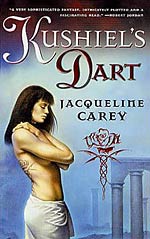
![]() Parnassus Reads
Parnassus Reads
4/26/2013
![]()
I first picked Kushiel's Dart up at random in a university book store. It was relatively new and still in HC. I must have stood there for at least an hour or more reading it. I was immediately entranced, and remain so. I had never been much of a fantasy reader as an adult (however, when I was a kid I read several of Tanith Lee's books, among others, so it wasn't too much of a stretch), but this book made me a permanent fan. Now, I am constantly searching for a heroine equal to Phedre no Delaunay; I'm not sure it's even a possibility.
In the league of world builders, Carey ranks among the highest. Her world is fully realized and feels as if it could actually exists. In part this is due to the fact that it an alternate version of our world, with several almost direct connections (this comes mainly through geography and through religion). I'm sure there is a more concise word for what she does here, but I am not well-versed enough in fantasy literature to know it. Regardless, Carey's world feels livable. The mythology of the world is unique and all encompassing; for each realm Phedre finds herself in, there is a complete, excellently planned history and mythology.
Her characters are wonderfully complex, even as they rely to a degree on high romance traditions (think Arthurian legends). The novel starts with Phedre as a child and continues through her upbringing first in the Night Court as damaged goods (in a world that prizes itself on physical perfection, a scarlet mote in one's eye (the titular "dart") is not a good thing) and then her transformation as the foremost courtesan and spy, though information-gatherer might be closer to the mark. One of the consistent refrains through this first trilogy is that "all knowledge is worth having," and by the end of the third book, Phedre goes to nearly the end of the world to discover more information. The finale of this book leaves readers in a lurch for the second; luckily for me the next in the series, Kushiel's Chosen, was due out soon, and luckily for you, the entire series is complete.
I quickly fell in love with her characters and her style. Carey herself has described her style in this series as "baroque," and this is very true. While it may be slightly of-putting at first, by the end of this book, I hardly even noticed it. It fit perfectly with the character that Phedre became. There is intrigue and plot aplenty in this book and in the rest of the series, but never does it feel as if Carey throws things in just because. While some revelations may seem somewhat obvious by the time they are given, for the most part, I was kept guessing. The who might sometimes be known, but the how is just as interesting and important. While I would not say these books are fast paced, they never drag either. All are well planned and well researched. I hate to give too much of a summary because it is too much fun discovering the world of these books on your own. If you are looking for an excellently written fantasy series that features an incredibly strong female lead, enough sexy romance to keep your pulse up and a plot to rival anything George R.R. Martin can dish out, this book and this sereis is for you. Fair warning though: there are explicit heterosexual and homosexual sex scenes, and there is also a healthy dose of BDSM themes (it's one of the main conceits of Phedre's character). If this makes you squeamish, it's your loss. The central theme of the book, and the only religious principal Phedre adheres to, is "love as thou wilt." A beautiful message enclosed in a beautiful narrative.